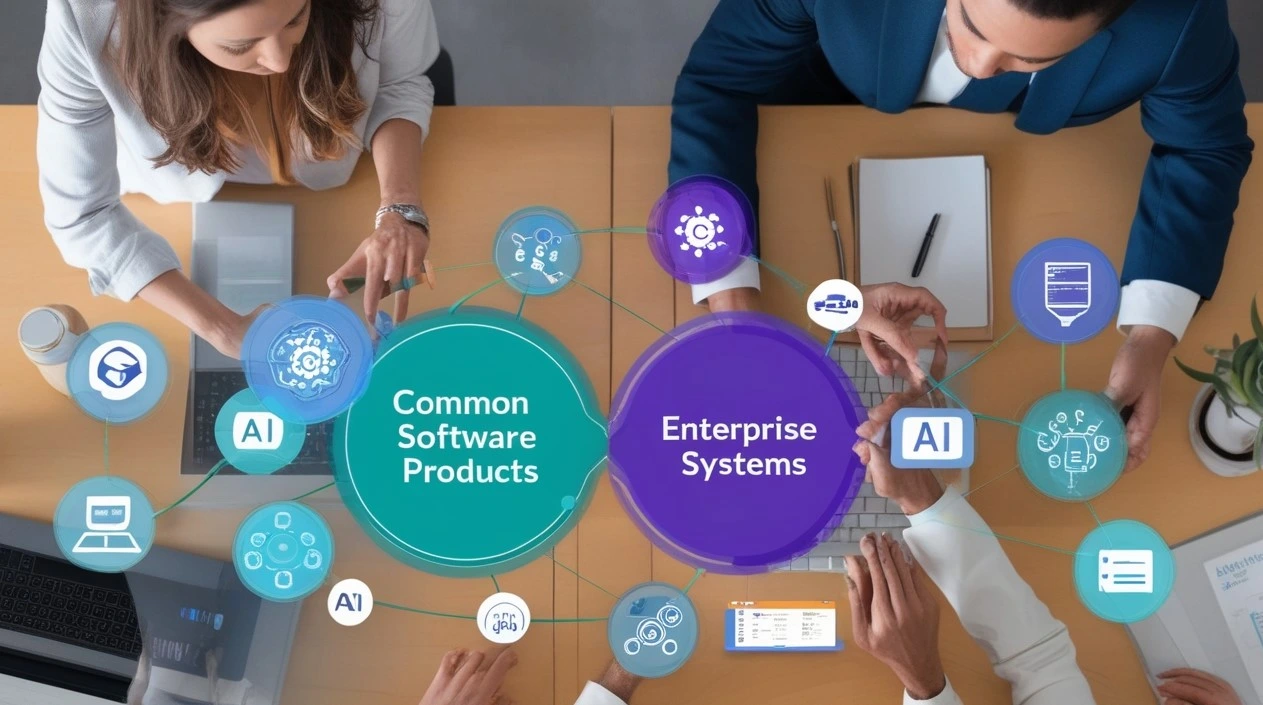Introduction
In the world of software solutions, businesses often face the choice between common software products and enterprise systems. As companies grow and evolve, this decision becomes crucial in shaping their operations, efficiency, and ability to scale. The right solution can mean the difference between streamlined processes and bottlenecks, or between manageable costs and overbearing expenses. Choosing wisely ensures that a business is not only equipped to handle current demands but is also well-prepared for future growth, technological advancements, and competitive pressures in an increasingly dynamic market.
This blog explores the differences between common software products and enterprise systems, and why finding the right fit is essential for businesses looking to thrive in an increasingly digital landscape.
Understanding the Options
Common Software Products are off-the-shelf solutions designed to cater to a wide range of users. They are generally easier to implement, cost-effective, and flexible enough for startups and small businesses. Examples include productivity tools, data visualization software, and customer relationship management (CRM) systems.
On the other hand, Enterprise Systems are comprehensive solutions tailored for large organizations, handling complex processes across various departments. These systems often require significant investments, extensive customization, and a longer implementation time, making them ideal for well-established companies with specific and diverse operational needs.
Why Start with Common Software Products?
For many businesses, starting with common software products makes the most sense. These solutions are widely used and trusted, offering businesses the tools they need to function effectively without the complexity or costs associated with enterprise-level software.
- Cost-Effective and Scalable: Common software products are typically more affordable and come with flexible pricing models that cater to businesses of all sizes. Whether it’s a small business or a growing startup, opting for these solutions allows for better cost control. Businesses can start with basic plans and scale up as their needs expand.
- Quick and Easy Implementation: One of the main advantages of common software products is their quick deployment. There’s no need for lengthy installation processes or complex technical configurations. Teams can get up and running with minimal disruption, which is a key factor for businesses looking to stay nimble and competitive.
- Customizable for Different Workflows: While these products are often used “off the shelf,” they can still be customized to fit specific business needs. Integrating them with existing systems and workflows ensures that companies aren’t forced into a one-size-fits-all solution but have tools that align with their processes.
When Enterprise Systems Become Essential
At a certain stage of growth, businesses may outgrow the capabilities of common software products and require more robust systems. This is where enterprise systems come in, providing advanced features that support large-scale operations, complex workflows, and higher data demands.
- Advanced Customization for Complex Operations: Enterprise systems offer a much higher level of customization, allowing businesses to tailor the software to their specific processes and challenges. From managing large data sets to automating workflows across multiple departments, these systems provide the depth and flexibility that growing businesses need.
- Cross-Departmental Integration: As businesses expand, having systems that integrate seamlessly across departments—finance, sales, operations, and HR—becomes critical. Enterprise systems centralize data and processes, creating a more cohesive and efficient operational flow. This helps businesses make data-driven decisions faster and with greater accuracy.
- Scaling for Growth: Large organizations dealing with complex processes and high transaction volumes require systems that can scale with their growth. Enterprise systems are built for such environments, handling increased workloads without compromising on performance.
Tailored Solutions: The Best of Both Worlds
One size doesn’t fit all. Businesses need software that adapts to their current needs and future growth. This is where a flexible approach—offered by many forward-thinking software companies—becomes key.
- Starting Small and Scaling Smart: For businesses just starting, common software products provide a solid foundation. They’re affordable, easy to implement, and scale as the business grows. The ability to upgrade and expand features without the need to overhaul the entire system makes these tools an excellent starting point.
- Seamless Transition to Enterprise Systems: When the time comes for businesses to move beyond common software products, having a partner who understands both options makes the transition to enterprise systems smoother. Companies offering both common software products and enterprise systems can guide businesses through this process, ensuring that the tools in place grow alongside their needs.
- Consultation and Support: Choosing the right software solution can be overwhelming, especially for businesses without dedicated IT teams. Companies that provide both types of systems often offer expert consultation to ensure businesses choose the best fit for their operations and continue to support them as they scale.
The Right Fit for Your Business
Whether a business is in its early stages or well-established, finding the right software solution is critical. Starting with common software products ensures a cost-effective, flexible foundation, while enterprise systems offer the scalability and customization needed for larger, more complex operations.
A company specializing in providing both common software products and enterprise systems can offer tailored solutions that evolve with the business, ensuring efficiency and growth at every stage. Looking for the right software solution to support your business? Get in touch with experts who can customize a solution designed to help your company thrive now and in the future.
